|
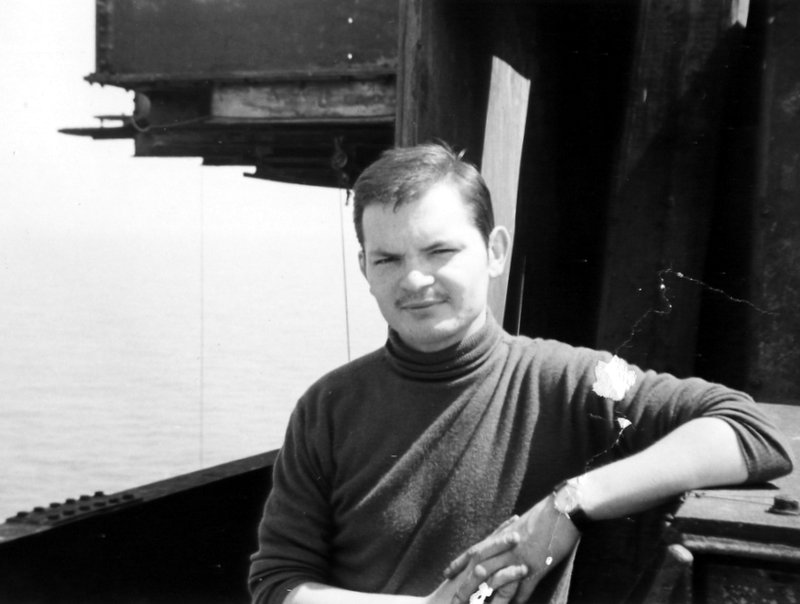
|
|
David Sinclair on Knock John fort, the home of Radio Essex, in 1966.
|
The newspapers often referred to offshore broadcasters as “pop pirates” and they did undoubtedly play plenty of pop. But they played a lot more besides and David Sinclair, who has
died at the age of 75, championed a style of music from an earlier era which might have been ignored if it hadn't been for him. He was the man who played big band swing music on the offshore stations.
|
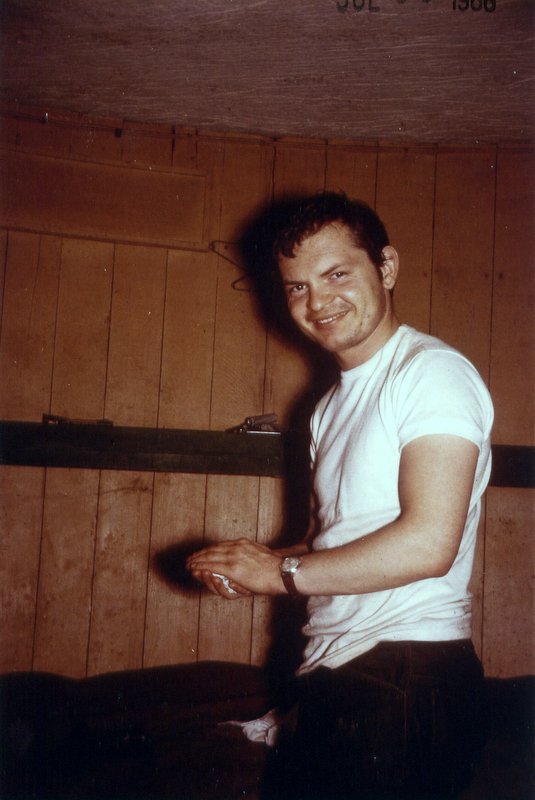
|
|
David Sinclair on Knock John.
|
Born in Northampton in 1942, his mother having been evacuated from London during the Second World War, his real name was David John Vincent. When the war ended, the family moved back down south and David
grew up in Orpington, Kent. After finishing his education he had a number of office jobs. He was a trainee printer, an accounts clerk in a shipping company and then a building society, assistant manager for a security firm and he
ran an entertainment agency but none of them satisfied him. He wanted something more. The arrival of offshore radio in 1964 had inspired him, as it did so many of his contemporaries. He wanted to be a pirate!
But where to begin?
Fortunately David chanced upon an article in The Orpington & Kentish Times. It was about local lad Richard Palmer who was working for Radio Essex. The smallest
of the offshore stations, Radio Essex was based on Knock John anti-aircraft fort in the Thames estuary. Richard lived less than a mile from David. After sifting through the Palmers listed in the local telephone directory to find his
address, David dropped him a line, asking how he could get involved with the station. Unfortunately by this time Richard had returned to the fort so David had to wait for his next period of shore-leave.
One morning, a few weeks later, Richard turned up on his doorstep. After warning the wannabe pirate about just how grim the conditions were on Knock John, Richard suggested that David make a demo tape. This he did, on a borrowed tape
recorder, and handed it over to Richard. Some time later Roy Bates, the owner of Radio Essex, called. He offered David a job and a salary of £12 a week. Despite this being rather less than he was earning at his office job,
it was the opportunity he had been waiting for. He accepted. He was now a pirate DJ - and he had a new DJ name. Roy Bates told him he was going to be called David Sinclair.
Radio Essex played middle-of-the-road music by day, pop at night, and as Europe's first 24 hour a day radio station, it is the late night ‘Essex Beat Club’ programmes which are probably best remembered now, especially as the
low powered transmitter's signal travelled much further late at night. But David wasn't a pop fan. He preferred easy-listening music and jazz, and the daytime output was more to his taste. He suggested a daily ‘Big Band Show’ on
which he could play a style of music of which he was particularly fond.
 David Sinclair on the Radio Essex ‘Big Band Show’ from 8th September 1966 (duration 2 minutes 12 seconds)
David Sinclair on the Radio Essex ‘Big Band Show’ from 8th September 1966 (duration 2 minutes 12 seconds)
 David Sinclair on an ‘Evening With Essex’ show from 21st October 1966 (duration 3 minutes 28 seconds)
David Sinclair on an ‘Evening With Essex’ show from 21st October 1966 (duration 3 minutes 28 seconds)
|
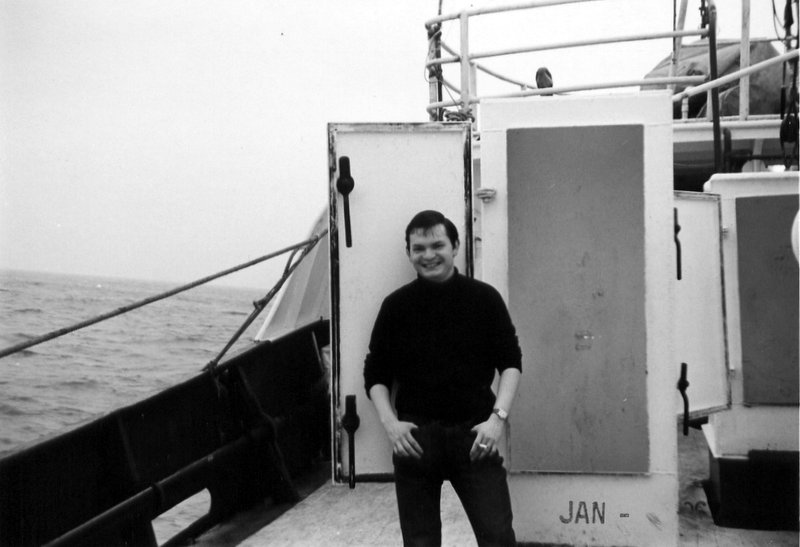
|
|
David Sinclair on Radio 270's mv Oceaan 7.
|
Radio Essex was a tiny station, operating on a shoe-string budget, and towards the autumn of 1966 what little money there was seemed to dry up. People weren't being paid, cheques were bouncing, and David decided
it was time to move on.
He discovered that Radio 270 needed some new DJs. The station was based on the mv Oceaan 7 anchored off Yorkshire. This ship had just endured a massive storm which had terrified the occupants. The DJs on board,
Leon Tipler, Andy Kirk and Alex Dee, had told the press that they thought the ship was unsafe - and been promptly sacked. Replacements were
required. David and his Radio Essex colleague Roger Scott were taken on.
Knock John fort had been relatively spacious and, being a solid structure resting on the sea-bed, didn't move around much, but the mv Oceaan 7 was very different. It was a small vessel in the stormy North Sea - and it took a bit of
getting used to!
And Radio 270's format was different too. David did get the occasional chance to play some of his preferred easy-listening tracks during the 9am-noon show but it was mostly high rotation Top 40. The late night Midnight Hour
programme was more relaxed but David did not feel totally at home on Radio 270. He began to ponder his next move.
 David Sinclair on The Midnight Hour in January 1967 (duration 3 minutes 58 seconds)
David Sinclair on The Midnight Hour in January 1967 (duration 3 minutes 58 seconds)
David had listened to Radio 390 while working on Essex and knew that this would be the perfect place for him. The music was more to his taste and he thought his presentation style would suit it better too.
David approached an agent who, in no time at all, had lined him up for an interview with Radio 390 Programme Director Peter James.
|
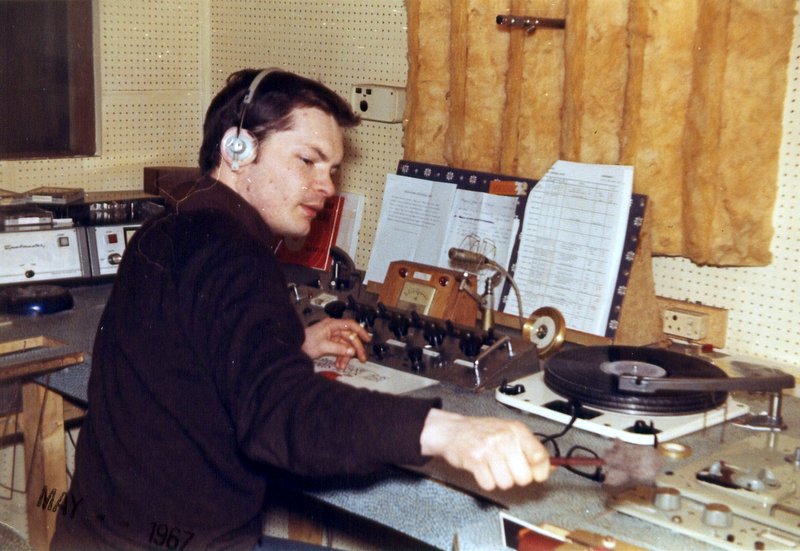
|
|
David Sinclair in the Radio 390 studio.
|
It was fortuitous timing. Radio 390 had just lost a number of announcers who had moved to Radio 355. There were vacancies to be filled and they needed experienced presenters. David was an obvious choice.
 David Sinclair on an edition of Radio 390's request show From Me To You from June 1967 (duration 3 minutes 43 seconds)
David Sinclair on an edition of Radio 390's request show From Me To You from June 1967 (duration 3 minutes 43 seconds)
 David Sinclair on Radio 390's Serenade on 10th July 1967 (duration 1 minute 53 seconds)
David Sinclair on Radio 390's Serenade on 10th July 1967 (duration 1 minute 53 seconds)
David persuaded the Radio 390 management that the station needed a big band show and so Swing Session came into being every Saturday and Sunday afternoon.
 David Sinclair on Radio 390's Swing Session from 15th July 1967 (duration 1 minute 44 seconds)
David Sinclair on Radio 390's Swing Session from 15th July 1967 (duration 1 minute 44 seconds)
Radio 390 fought a long legal battle to survive but eventually was forced to close down on 28th July 1967. David was out of a job. He wanted to stay in radio but opportunities in the UK were limited. He
decided to emigrate.
He left the UK for Canada on 27th October 1967 to begin a new life. He reverted to his real name and, as David Vincent, worked as a broadcaster and voice-over. Initially he was an announcer on CHWO Oakville,
Ontario, then in 1970 was appointed Music Director at CKSO Sudbury, Ontario. In 1971 he became Program Manager for CFTK Television in Terrace, British Columbia. In 1974 he moved to Edmonton, Alberta, and joined CKXM-FM as Program
Manager. 1986-91 he was an announcer for CHQT and between 1987 and 1992 was also Chief Instructor at the Columbia Academy Of Radio & TV Arts, both in Edmonton.
His son Christopher has kindly provided details of David's later life in Canada: “Settling in the Edmonton, Alberta, area in the mid-seventies, he met and married my mother Rachel (divorced 2001) and went on to have three boys
(Christopher, Stephen and Ross). They started a home-based mail-order business (Mayfield Music) when dad realised he couldn't get the records he liked here. He began importing records from Europe and distributing and retailing them in
the underserved western Canadian market. There was no shortage of ex-pats and Europeans living out here at the time. They then extended that same business model to include importing ‘shoe spikes’ from Germany - little
studded rubber things that slip over your boots to help with walking on ice. Brilliant idea that no one out here had ever seen before but there was certainly a need for it - of course, lots of places sell them now. Those businesses
wound down operations somewhere in the late nineties with the emergence of e-commerce. The home-based business allowed for some interesting things: we were the first family I knew of to have a computer - we still have the receipt from
about 1984 ($8,400!) - and by far the first to have a CD player (about the same year).
After dad finished instructing at the Columbia Academy of Radio Broadcasting in the early nineties, he developed his own professional training seminar called VIP (Voice Improvement Program). Dad then went on to a career in outside
sales starting in, I would guess, the mid-to-late nineties. He did this for the next number of years until his retirement. It was a lifestyle that suited him well as he had been spouting ad copy his entire adult life and he was able
to schedule his own appointments, allowing him the flexibility to keep up with his other part-time gigs and projects.
Of course, throughout all of this time he was regularly doing voice-over work for ad agencies and small acting roles in commercials, television and occasionally film. After retirement he spent the last few years of his life as a
volunteer board member for the Canadian Condominium Institute - North Alberta Chapter and was also the editor-in-chief of their quarterly publication (‘InSite to Condos’). My brother Ross does the layout and graphic
design.”
|
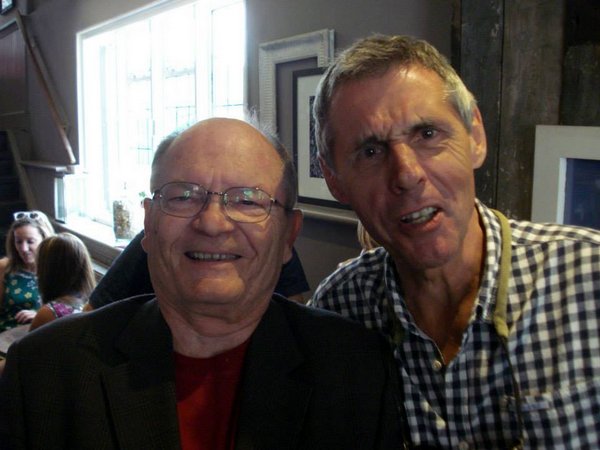
|
|
David Sinclair, left, with his old colleague Mark West at a Radio Essex reunion in 2015. Photo courtesy of Andy Cadier.
|
In 2015 David published Making Waves, the story of his career in offshore radio. Your webmaster was honoured to be asked to write the foreword. Other books have told of the big pirate stations of the era
but David's is unique in that it concentrates on three of the smaller stations. It is highly recommended (see below).
He kept in touch with old pirate pals and made it across the Atlantic for occasional reunions. We have pictures of him at Radio Essex's 40th and 50th anniversary gatherings. He was a
great help to this website providing information, stories, photos and recordings for which we are enormously grateful. (All the audio and most of the photos on this page were provided
by him.)
David died at approximately 1:30am on 13th March 2018 in St. Albert, Alberta, surrounded by his family. He was 75 years old. He had enjoyed a long and successful career in radio. And it all began with that chance spotting of a
newspaper article.
A number of friends and former colleagues have paid tribute to David:
“After the closure of Radio 390, David saw his future behind the mic in Canada. The rest of us got out our World Radio-TV Handbooks and searched for addresses of (preferably commercial) radio stations
across the English-speaking world but David was settled on Canada from the outset. Close on his heels I too was granted immigrant status for loggie-land but chose to ‘wait for something to crop up’ in my home country;
nothing did for some time! While I was brazening it out in the metaphorical cold, David slung his hook to the meteorological cold and never looked back. Although David was a thoroughgoing Orpington lad (he was over the moon about
the 1962 Liberal Party by-election success there), he had since I first knew him in early 1966 a disdain for prevailing English attitudes and mores and by the summer of 1967 he knew this was no longer the land for him. He was
particularly scathing of the broadcasting landscape post August 14 and determined that he would flex his ‘pipes’ and join the chorus of baritone cadences on Canadian radio. CHWO was his first port of call and CKSO radio/tv,
where he was PD, followed; other stations too benefited from his calling. We kept in touch initially upon blue airmail letter-forms then graduated to what used to be called ‘tapesponding’ - corresponding via the magic of
1/4 inch magnetic tape. The difference between each end of the two-way was stark. David's voice had already dropped an octave, whereas mine was still relatively unpractised. But then there were the airchecks from our respective
countries. David would send recordings of beautifully finessed popular music radio. What he was unlucky enough to get from me was the only radio we had. At least Late Night Extra included a few ‘gramophone records’
of a middle-of-the-road nature with BBC house orchestras providing miserable cover versions of the rest. It was no doubt this alone that convinced David that he had made the right move - not that he needed any convincing. RIP David
Vincent.”
Roger Scott, colleague on Radio Essex, Radio 270 and Radio 390
“David styled himself on air as ‘Your very good friend’. And he was too, to a lot of us who knew him ever since the heady days co-existing out on the remote Knock John Fort. After Radio Essex,
Dave and I worked together again on the Radio 270 ship off Yorkshire, although on separate shifts. I think it's true to say that our friendship not only continued after the pirates, but deepened, if from a long way away. When his
family came along and he opted for a radio career in western Canada, we kept in regular touch. I miss hearing his vibrant Canadian tones, and realise now how much I miss too his weekly roster of jokes, which I had been known to
contribute to. Dave was immensely likeable, humourous but never too savage. It was good to see him again for the Essex 40th and 50th reunions. Only recently, it was a treat too to hear his smoky voice reading Making Waves,
his book about our Radio Essex experiences, which I am proud to have shared with him. RIP, David.”
Guy Hamilton, colleague on Radio Essex and Radio 270
“So sorry to see David Sinclair has hung up his headphones and gone and joined the heavenly network. Thank you for a job well done and the pleasure you gave us in your broadcast career with Radio 270
& 390, and the Canadian networks. Rest in peace my friend. Thank you for a job well done.”
Radio 270 and Radio 390 engineer Stephen Muirfield (on Facebook)
“That is really sad news. I enjoyed working with him, listening to him and being in his company. RIP.”
Brendan Power, colleague on Radio 270 (on Facebook)
“Sad news. Dave was one of the guys who arrived from Radio Essex also Roger Scott (good to catch up with Roger at 50th) and Mike H. They replaced Alex, Andy and Leon. Fitted in really well, easy going top
presenter. At that time things were very hectic so I never got to know him well. But everyone who was on board Oceaan 7 shares a common bond. Vale Dave Sinclair.”
Noel Miller, colleague on Radio 270 (on Facebook)
“Adieu Dave.”
Mike Hayes, colleague on Radio 270 (on Facebook)
“A most talented and likable man and so very modest too. RIP David.”
Andy Cadier, known as Michael Cane on Radio Essex (on Facebook)
“And another fine man passes into offshore eternity. Remembering Happy Daze.”
John Ross-Barnard (on Facebook)
With grateful thanks to Christopher Vincent for his help.
See also the obituary in the St. Albert Gazette.
After being out of print for some years David's book, Making Waves, is now available again, FREE! See here for details.
|

